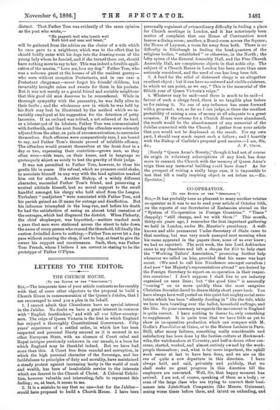LETTERS TO THE EDITOR.
THE CHURCH HOUSE.
.[To THE BEMS OF THE " SPECTLTOE.1
SIR,—The temperate tone of your article contrasts so favourably with that of some other objectors to the proposal to build a Church House in commemoration of the Queen's Jubilee, that I am encouraged to send you a plea in its behalf.
1. I cannot admit that Churchmen have no special interest in the Jubilee. No doubt we have a great interest in common with "English freethinkers," and with all cur fellow-country- men. The reign of Queen Victoria is the first in which England 4ias enjoyed a thoroughly Constitutional Government. Fifty years' experience of a settled order, in which law has been respected and personal liberty secured as it is secured in no other European State, with an absence of Court cabal and Royal intrigue previously unknown in our annals, is a boon for -which England may be thankful indeed. But we have had more than this. A Court free from scandal and corruption, in which the high personal character of the Sovereign, and her faithfulness to principles of duty and morality, have maintained a steady protest against increasing laxity in the world of rank .and wealth, has been of incalculable service to the interests which are dearest to the Church of Christ. A Colonial Exhibi- tion, however valuable and interesting, fails to represent this feeling; so, at least, it seems to me.
2. It is a mistake to say that no one—but for the Jubilee— would have proposed to build a Church House. I have been personally cognisant of extraordinary difficulty in finding a place for Church meetings in London, and it has notoriously been matter of complaint that one House of Convocation must borrow a dining-room ; another, a Board-room across the Square; the House of Laymen, a room far away from both. There is no difficulty in Edinburgh in finding the head-quarters of the religions bodies, " established " or otherwise, in the North ; the lofty spires of the General Assembly Hall, and the Free Church Assembly Hall, are conspicuous objects in that noble city. The subject of a Church House in London has been more than once seriously considered, and the need of one has long been felt.
3. A fond for the relief of distressed clergy is an altogether excellent object ; but it can have no outward and visible existence, to which we can point, as we say, " This is the memorial of the fiftieth year of Queen Victoria's reign."
4. Whatever may be said—and there is much to be said—i favour of such a clergy fund, there is no tangible plan before ns for raising it. No one of any influence has oome forward with a proposal ; nor, as far as I can judge, is there the smallest probability of raising a sum of money at all adequate to a great occasion. If the scheme for a Church House were abandoned, the result would be the abandonment of any memorial of the Jubilee connected with the Church. I gather from your article that you would not be displeased at the result. For my own part, I should very much regret such a failure ; and I heartily wish the Bishop of Carlisle's proposal good success.—I am, Sir, J. F. OxoN.
[Surely " Queen Anne's Bounty," though it had not of coarse its origin in voluntary subscriptions of any kind, has done more to connect the Church with the memory of Queen Anne's reign than any memorial building could have done ? As for the prospect of raising a really large sum, it is impossible to test that till a really inspiring object is set before us.—En. Spectator.]














































 Previous page
Previous page